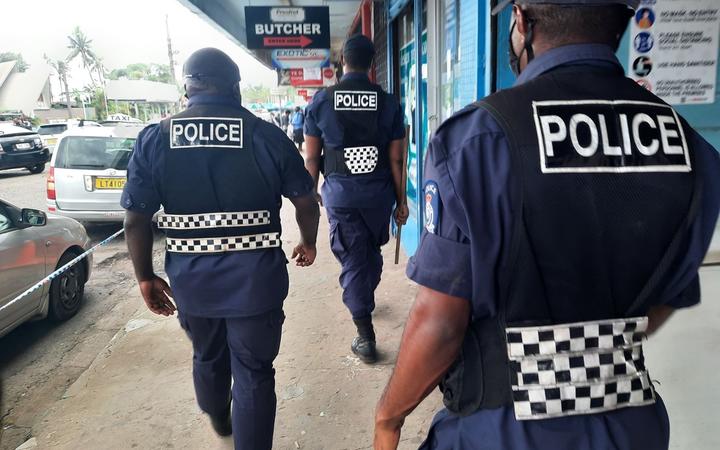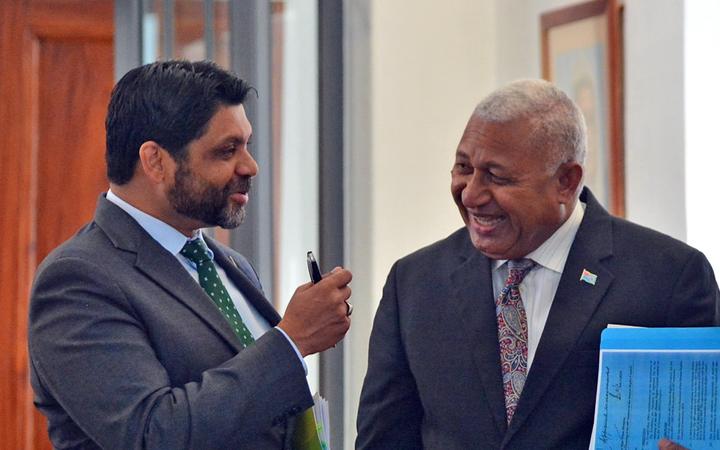ANALYSIS: By Steven Ratuva
The frequent detention and questioning of some of Fiji’s political leaders by the police late last month for merely engaging in public debate on the contentious iTaukei Land Trust Bill No. 17 has raised questions about Fiji’s claim to be a champion of human rights.
All this has happened when the country was losing its grip on the escalating covid-19 pandemic, and experiencing the worst economic crisis in its history. The only silver lining for Fiji was the glittering Olympic gold won by its Rugby 7s men’s team and bronze by its women.
But these temporary celebratory moments should not divert attention away from the long-term implications of the repressive responses to alternative ideas by the government.
The coercive measures were justified by the police and government as important for sustaining national security, an often arbitrarily defined term. The rationale is that comments against the bill by politicians have the potential to stir up racial tension and public discord.
At the centre of the controversy is the attempt by the government to liberalise the use of indigenous Fijian land and give more power to lessees to carry out such things as sub-leasing and mortgaging without the consent of the iTaukei Trust Board (ITB), which was established in 1940 to administer indigenous land.
Opposition to the bill spans a variety of political positions. Those on the nationalist end of the spectrum argue that it was part of a “Muslim conspiracy” to alienate indigenous land. Certain individual keyboard warriors even resorted to the use of online racial threats.
The more moderate ones argue that given the cultural and racial sensitivity around land issues, the bill was insensitive and itself a security threat. There was nevertheless consensus that the process used to push through the bill lacked proper and meaningful consultation with landowners and the public generally and thus lacked democratic legitimacy.
One of the fears raised is that removing the regulatory process of subleasing and mortgage by lessees can lead to the Vanuatu situation where 90 percent of land on the main island, Efate, has been alienated through extensive subleasing and selling by foreign investors with little income for the landowners.
To get their land back at the expiry of the lease period, landowners have to pay back millions of dollars worth of land improvement value, something no one is able to do.

Cycle of vengeance
The response by Fiji’s government and the police was to invoke the Public Order Act, a leftover from the British colonial days, which was made even more coercive through the 2012 Public Order Amendment Decree by the then military government. The Act gives the police unlimited powers to arrest anyone they deem to be a threat to public order and safety.
The arrests of leading opposition politicians, MPs and former prime ministers have raised a number of fundamental questions about human rights and freedom of expression in Fiji’s struggling constitutional democracy.
One of the critical issues is that the institutional norms, political psyche and behaviour associated with military coups have been embedded implicitly in Fiji’s constitutional and legislative systems.
Despite the elections and global projections of being a vibrant democracy, the arbitrary use of repressive means to suppress alternative views remains a lingering issue.
Well-meaning actions and words by citizens are securitised and considered a threat, while the entire security apparatus of the state is let loose on so-called perpetrators of instability.
The second point here is that this military psyche permeates through society in various subtle ways, creating a culture of fear and distrust and worsened by what people see as the government’s uncompromising tactics in micro-management of the civil service, as well as the use of the merit system as a tool of nepotism and patronage in civil service and board appointments.
Normalisation of the use of fear and psychological intimidation in the civil service, Parliament and society generally may result in short-term compliance but can spawn silent resistance which can explode into a major security issue in the future.
Driver of political antagonism
A third and related factor here, resulting from the hardline stance of the government, is the way in which Fiji politics has taken a dangerously dichotomous cycle of vengeance and counter-vengeance as a driver of political antagonism.
Both sides of the political divide have dug into their trenches with hardly anyone in “No Man’s Land” to keep a sense of restraint. The repressive tactics will only fuel counter-vengeance sentiments at a time when the country needs to focus on covid-19 and associated problems.
A fourth issue here is the battle for the moral high ground. The government policy of “racial blindness” has given them the licence to cast almost anyone who raises issues relating to identity and culture as “racist” or trying to inflame racial strife. This is certainly the case with the bill in question.
Public criticism of acts of nepotism, patronage and racial favouritism by government have often been constructed with racial lenses and thus framed as security threats.
Sociological research in various countries has shown that the policy of so-called racial blindness is ironically a racist prism in itself because it does not allow one to appreciate the value of racial diversity and it can actually be used as a Trojan horse for cultural nepotism and ethnic patronage by states. Many have accused the Fiji government of doing exactly that.

Who benefits from development in Fiji
The fifth and last point relates to what the bill represents in terms of the broader development strategy of Fiji. Because of the four points raised above, the efforts of the government to sell its rationale have not gone smoothly.
The critical question here is whether the bill was originally intended to benefit the landowners or was it to serve the interests of foreign investors and other local entrepreneurs who have been part of the government’s lobbying and patronage system.
I do not want to speculate on this but the point here is to do with what type of development is best for the landowners?
Covid-19 has shown us the fundamental fragility of the tourism-based economy and the need to strengthen the land-based social solidarity economy. This requires developing a comprehensive land innovation plan which includes training for landowners in modern agriculture, developing food processing plants and creating global markets in a holistic way throughout the value chain.
This will allow landowners to commercialise and acquire direct benefits from their land, empower them economically and address prevalent poverty.
A number of communities in Fiji have been able to do that at a very localised level, making millions of dollars even without any government support. A much larger model to look at is the multi-billion dollar Ngai Tahu indigenous corporation in New Zealand’s South Island.
Rather than remain passive lease money recipients and subservient players in the market economy as the current system promotes, landowners can be active players in the market.
The land bill in question will simply perpetuate the system of post-colonial servitude. Rather than making minor “administrative” adjustments which will only benefit some foreign and local individual entrepreneurs as the bill suggests, it is time to relook at alternative, equity-based and innovative development strategies with landowners as active participants and direct beneficiaries as empowered partners with other investors.
This will address the issues of poverty and inequality as well as create a much more favourable climate for national security for all.
The future of security in Fiji depends not on using repressive tactics to impose government’s will on the population, but on using an approach which incorporates equitable and people-centred development strategies, empathetic political governance and a reconciliatory way to unite different ethnic, cultural and political groups.
Arresting political leaders will only exacerbate tension and shamefully reveal the deeper structural and normative weaknesses of the ruling political class.
Dr Steven Ratuva is a global award-winning political sociologist and is director of the Macmillan Brown Centre for Pacific Studies at the University of Canterbury.This article was first published by RNZ News and is republished with the permission of the author.
This content originally appeared on Asia Pacific Report and was authored by APR editor.
APR editor | Radio Free (2021-08-09T20:00:12+00:00) Steven Ratuva: Repression not the answer to Fiji’s political dilemma. Retrieved from https://www.radiofree.org/2021/08/09/steven-ratuva-repression-not-the-answer-to-fijis-political-dilemma/
Please log in to upload a file.
There are no updates yet.
Click the Upload button above to add an update.